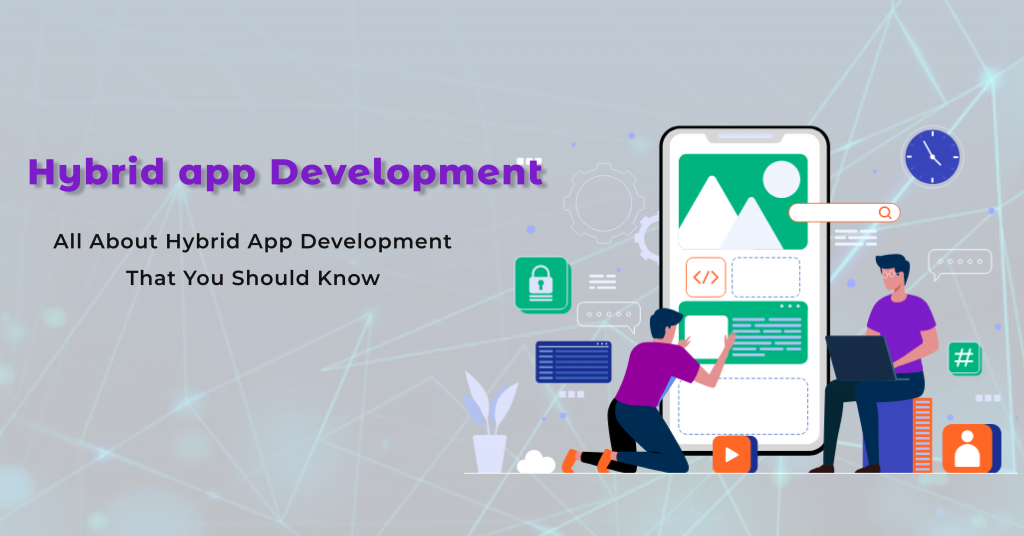
Hybrid app development is one of the hottest subjects in technology. It has gained popularity primarily because it lets apps be built quickly and cost-effectively and operate across various operating systems and platforms without rebuilding the entire app by hand.
Hybrid apps aren’t as widely utilized as native applications, but they have many advantages that everyone should consider.
So, what exactly is the definition of hybrid App development? This article will go over the definition of hybrid application development in depth and explain why it could be the right choice for you. We’ll also go over the various stages involved in developing a hybrid app and the best frameworks to choose from.
What is Hybrid App Development?
The hybrid development approach is based on creating an application with just one project, using a framework which will work on all platforms: Android, iOS, Windows, etc.
Hybrid software is appealing since developers can develop one code base that can be used for the application on any platform. Other than some aspects of the application (the principal feature being its UI that users would expect to be customized to their preferred platform), developers have to write their code once, and after that, it can be reused for making applications for another platform.
Two undisputed facts drive this demand to develop hybrid applications. It is easier to create than native apps, and the source code can increase a company’s reach across multiple platforms, such as the web.
The hybrid mobile application development market is attractive to companies because it allows them to simultaneously be part of the mobile market across all the major platforms.
What makes a Hybrid App Different from a Native App?
Hybrid app development lets you develop your app once and then distribute it to different platforms like iOS, Android, or Windows. This can save developers time working on numerous projects explicitly developed specific to each operating system.
Creating apps developed with a hybrid approach can be made more accessible as frameworks are updated frequently with new features. This allows developers to use particular platform features while retaining their familiar developing environment.
However, this can have the side consequence of making the base code bigger since it has to consider all various platforms and OS versions the app is designed for.
Native app development, however, is specifically designed for a specific platform and typically takes longer to create. Native apps are generally more efficient than hybrid apps because they are designed to work on their intended platform.
It’s all about the specific requirements of your app and what you’d like your app to achieve. If you’re only looking to build for a single platform or performance is a significant aspect of your application, you’ll prefer to create an app native to the platform.
But what if you want to build multiple platforms simultaneously? If you’re seeking an affordable solution to your project and you’re not worried about having some functions that don’t work equally well on one platform over another, hybrid application development could be the best choice for you.
Best Hybrid App Frameworks
A variety of hybrid app development frameworks are available. Each framework has strong and weak points, so you must choose the one most suitable for your project.
- React Native
React Native was introduced by Facebook in 2015 and is a platform-independent mobile application development framework built on React. It’s an open-source Javascript framework that lets users create multi-platform user interface elements using JSX that are connected to native code and then converted into Android or iOS native user interfaces.
These views, which are native elements, interact using logic written in JavaScript via the bridge. The code runs within the JavaScript thread.
- Flutter
Flutter is an open-source framework designed by Google that utilizes the programming language they created, Dart. It allows apps to desktop, mobile, and web platforms and embedded devices.
While it’s among the more modern frameworks on this list, it has received widespread acceptance by developers because of its speed of development and flexibility to utilize a wide variety of widgets.
- Apache Cordova
Apache Cordova is an open-source, cross-platform software for developing mobile applications. It lets you create mobile applications by using standard web technologies. Applications developed using Apache Cordova operate in the WebView in the native wrapper for applications.
- Ionic
Ionic is a well-known framework that utilizes HTML, CSS, and JavaScript to build hybrid mobile applications. It’s robust, user-friendly, and has built-in support for AngularJS, making it more appealing to front-end designers acquainted with the platform.
- Xamarin
Microsoft developed the Xamarin application framework to create mobile applications built on the .NET framework and C# programming language. It allows you to develop applications and connect to the native APIs available for iOS, Android and Windows.
- Unity
Unity is often referred to as a hybrid framework for applications. However, its primary purpose is to create games and other graphically demanding entertainment (such as AR and VR experiences). It employs C# as its programming language.
It can be used to create applications for mobile or web; however, they come with a different experience than the other choices on this list. This is the most suitable option if you plan to create an entertainment-oriented app.
Unity is also among the most adaptable: it can be used with Windows, Mac, Linux, iOS, Android, and Web (through WebGL); based on these choices, What hybrid app framework is the most suitable for you? It’s based on your capabilities, knowledge, experience, and project needs.
Advantages of Hybrid App Development
There are many advantages to using hybrid app development. One of the significant advantages is using a mix of technology to develop your application, giving you great flexibility.
You’re not restricted to only one platform or type of technology, So you’ll discover the most effective tools for your job.
Furthermore, a hybrid approach lets you increase the number of app users across multiple devices. This is particularly important when reaching users who need the latest and most advanced technology.
In addition, hybrid app development tends to be more responsive and faster than traditional web-based apps that provide a superior user experience.
In addition, here are seven other advantages of developing hybrid apps using technologies:
- Ease of Development
Hybrid applications are much easier to build than native apps since the developer doesn’t need to be familiar with the language used by each platform.
Hybrid app development languages typically are based on web technologies (the trio comprising HTML, CSS, and JavaScript); however, C# is another popular option.
- Maintainability
Hybrid applications allow developers to sustain their code across different platforms with little effort. A single backend can be used to power all the apps, and any updates to the backend are pushed out swiftly. This can help developers speed up development since they do not require different backends for every platform they work with.
- Performance
Hybrid applications tend to be smaller than native applications because they all run on one procedure and share memory. Based on how it’s created, a hybrid application can have a higher level of responsiveness than an application made using native technology. Therefore, Hybrid app development is in extremely high demand.
- Cross-Platform Compatibility
They are made to be able to run on several platforms simultaneously. They don’t face the same limitations as applications created specifically for one platform. This makes them perfect for companies wishing to have their presence seen by every potential customer.
- User-Experience
Hybrid apps can reuse elements and designs across different platforms, which creates a better user experience. This will improve the reputation of an application because users are presented with the same design and feel, regardless of the device they’re using it on.
- Speed to Market
Making a hybrid app may be much quicker than creating a native application. This is especially true when developing an app that works on multiple platforms, and the code could be shared with most users.
- Cost-effective
Hybrid applications are usually more affordable than native apps, and the cost could quickly add up in the case of an individual developer or small group. With the help of techniques for hybrid websites, companies can develop hybrid applications at less than the expense of constructing native apps.
Apart from hybrid app development, people also seek services like Entertainment App Development that will make a real difference in their lives.
Disadvantages of Hybrid Application Development
Hybrid app development is beneficial in a variety of ways. However, it also has some drawbacks. Here are a few of the top disadvantages of hybrid app development that you need to take into consideration:
- The new features can take time to Release
Hybrid frameworks for the development of apps are highly flexible and beneficial; however, they sometimes upgrade after a particular feature is launched on a specific platform. Developers typically take some time to incorporate these features within the framework.
If you’re searching for cutting-edge technology for your platform, make sure the framework you choose is compatible before you commit to developing it.
- Low Performance and Larger size than native Apps
Although these frameworks will be quick and often compete with native apps in terms of performance, at the end of the day, a native application is almost always more efficient.
Hybrid frameworks will always create overhead because they use libraries and other code fragments to invoke native code, while native apps can call native code directly.
The added libraries can also bring another drawback in the form of an increased-size app when the app is installed.
Hybrid App Development: Stages
Hybrid app development is a blend of native and web technology capabilities. Hybrid applications are created using frameworks such as PhoneGap and Ionic for rendering UI elements, which means they can be viewed on mobile devices just as native apps perform.
Let’s Examine the various Stages of Developing a Hybrid application:
- Pre-Development
At this point, you will need to decide whether a hybrid development approach is the best choice for your application. Also, you must research the best tech stack and select the appropriate instruments and platforms.
- Development
This is where you create the Hybrid application development code. It is also necessary to use a cross-platform program such as PhoneGap and Ionic to build hybrid mobile applications. This is also a part of UX/UI development, architectural design and functionality development.
- Testing
This is the time to thoroughly test your hybrid project for app development (most likely, it’s a prototype) before releasing it to production. This involves testing the front end as well as the back end for your hybrid development project.
- Deployment
In this last stage, you’ll deploy the hybrid mobile application on one platform or several platforms that are accessible to users. It is either necessary to submit the hybrid application development plan to the respective app stores for Android/iOS devices or host them through a web server.
- Maintenance
Hybrid app development is a continual process. In time, you’ll require changes to your mobile hybrid application to your company’s requirements or launch new versions with more features.
Hybrid app developers must continue to make bug fixes and improvements to existing hybrid apps throughout the project’s life. It is also essential to keep updated on the most recent trends in Hybrid app development and technology to stay ahead of your competition.
How do you choose the Best Hybrid Mobile Application Development for your company?
There is a variety of answers to this query. You must consider the specific requirements of your business and then find an app development company which can satisfy those requirements.
Here are a few things to consider in making your choice:
- The Platforms Your App Will Run On
Not all firms for app development are experienced in creating apps that can run across every platform. Check to see if the firm you select has experience developing hybrid apps that are compatible with the devices the users of your app use.
- The Features Your App Will Have
All hybrid apps are not made to be the same. Sure, developers specialize in creating essential, simple apps, while others specialize in more complicated applications. You should ensure that the developers you select are experienced and knowledgeable in developing the features that your application requires.
- The Timeframe for Development
What is the time frame for your application to be ready to launch? It is essential to think about this when making your choice.
- The Cost
Hybrid app development may not be inexpensive, but it’s less expensive than creating an original native app. You should have a budget and choose a company that will work within your budget.
- The Level of Customer Service
How important is customer support to you? Check that the firm that develops the apps you select has an excellent reputation for offering quality customer service.
Get the Best Hybrid App Developers Now
To help you make the right choice, you should first study the entire scenario regarding what you want. After evaluating everything, you must make the right choice regarding choosing your partner. There are a lot of organizations that can help you in the Hybrid app development process, but choosing Maxta Technologies Private Limited is going to make a significant difference. Our team of the best hybrid developers can help you achieve your goals smartly.









